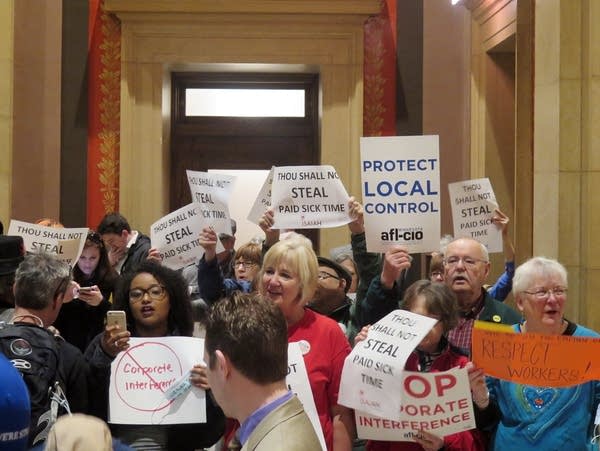Senate passes bill to restrict local labor rules

Legislation that would roll back sick-leave ordinances in Minneapolis and St. Paul and stop cities from setting the local minimum wage higher than the state level passed in the Minnesota Senate Thursday by a vote of 35-31.
Once merged with a House-passed bill, the final decision would fall to Gov. Mark Dayton, who isn't saying what he'll do.
The legislation is called preemption because the state would be restricting what could be done down the government food chain.
In a sign of how controversial the issue has become, senators arriving for the debate had to weave through a throng of protesters — some wearing surgical masks — who were waving signs and chanting.
Create a More Connected Minnesota
MPR News is your trusted resource for the news you need. With your support, MPR News brings accessible, courageous journalism and authentic conversation to everyone - free of paywalls and barriers. Your gift makes a difference.
The measure's supporters say it's about setting uniform standards statewide, so businesses don't get caught up in a bureaucratic thicket.
Bill sponsor Sen. Jeremy Miller, R-Winona, said allowing each of Minnesota's 835 cities to draw up its own labor regulations would be a big burden on businesses.
"I believe we are protecting local control with this bill because we are protecting the relationship between employers and employees," he said. "And when it comes to wages, benefits and salaries that's best negotiated between the employer and the employees."
The debate came on a day when state officials announced Minnesota's unemployment rate fell to 3.8 percent for March. Miller said a strong job market means that the market for labor will compel employers to raise wages and add benefits.
Sen. David Osmek, R-Mound, echoed him on that point.
"There's not one rule in our state statues, there's not one law on the books that prevents any business from offering those benefits on their own, and many do," Osmek said.
But on the other side of the issue are those frustrated by a lack of action at the state and federal level, who have been taking their case for higher workplace standards to city halls.
Minneapolis leaders adopted a policy last year requiring all but tiny employers to let workers accrue an hour of paid sick leave for every 30 hours they work, capped at 48 hours for the year. St. Paul officials ratified a similar ordinance, though without a carveout for businesses with fewer than five employees.
Both would apply starting in July. Duluth is weighing a policy of its own. The bill at the Capitol would block any such ordinances — and make the ban retroactive to January 2016.
"Now in the name of a disguise called uniformity the state wants to ambush this effort," said Sen. Bobby Joe Champion of Minneapolis, the first in a parade of Democrats to slam the bill.
Freshman DFL Sen. Matt Little, a former Lakeville mayor, criticized Republicans as intruding on local governance.
"Minnesota state government has always set minimum standards of protection and benefits for people. It's never said you can't achieve more, you can't get more," he said. "This bill sets a ceiling and I don't think that's the proper role of state government."
And several said it would strip meaningful benefits from lower-income workers just as they were about to kick in.
Eli Edleson-Stein, 27, is among those who would be affected. He works as a server in a south Minneapolis restaurant and has worked in that industry since he was 17. He said he was looking forward to finally gaining a sick-leave bank.
"Basically there are times when I'm faced with this moment of, like, do I not go to work and make it harder to pay the bills or do I come in when I'm a little bit sick and deal with people's food?"
Business owners have been vocal in the debate over the past few months, too.
National Federation of Independent Businesses state director Mike Hickey said his members are worried about proposals for a $15 minimum wage taking hold in the Twin Cities and spreading into regional centers.
"Everybody wants to provide a nice benefit to their workers, but a small little, two-, three-person business in the first or second month of their lifetime, can they really deal with this?" he asked. "They are looking at a 50 percent failure rate in the first year and so the challenges are really immense."
The bill heads next to a likely conference committee. It's not clear if it will continue to move on its own or be attached to a budget measure.
Meanwhile, Dayton is withholding a decision until seeing the final version. But he told reporters Thursday he has plenty of reservations.
"It's both the fact that fact of the state superceding the local government authority as well as imposing a set of limitations that I think are maybe not desirable," he said.